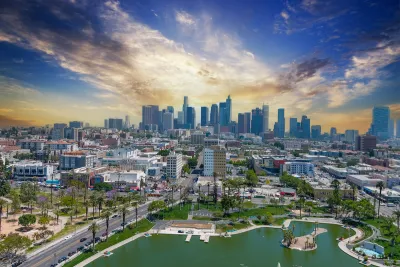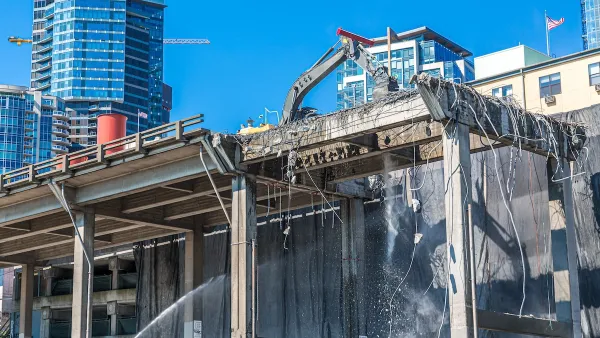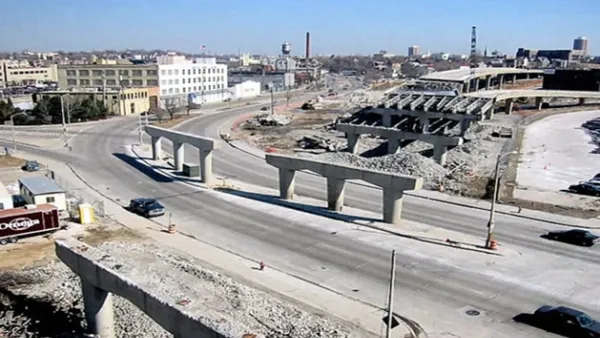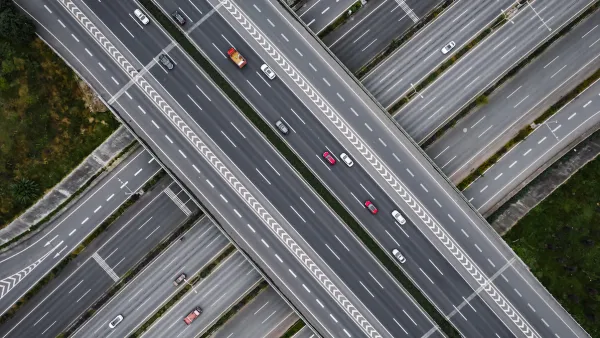Seven grant awards totaling $162 million will be used for planning, capital projects, and regional partnerships to reduce environmental harm and improve access in disadvantaged communities.

Administered by the U.S. Department of Transportation (DOT), the Reconnecting Communities and Neighborhoods (RCN) Program seeks to:
- Prioritize disadvantaged communities;
- Improve access to daily needs such as jobs, education, healthcare, food, and recreation;
- Foster equitable development and restoration;
- Reconnect communities by removing, retrofitting, or mitigating highways or other transportation facilities that create barriers to community connectivity, including to mobility, access, or economic development.
As reported by Joe Linton in this article, RCN grants totaled $237 million for California. Of that, L.A. County secured about two-thirds: $162 million. Over 90 percent of this funding goes to Metro, nearly all of that for one $139 million grant to fund 14 miles of bus priority lanes, 23 miles of bus corridor enhancements (i.e. transit signal priority, all door boarding, and bus shelters), 60 Metro Bike Share stations plus first-last-mile improvements, and five mobility hubs.
Three of the grants for L.A. County seek to reconnect and/or expand parkland, including:
- $800,000 to L.A. County for the Reconnecting East Los Angeles: 60 Green Bridge Project for Belvedere Park - planning. The county will plan for a cap to be developed over the 60 Freeway bridging the two sides of Belvedere Park, near the East L.A. Civic Center, the current terminus of the Metro E Line.
- $2 million to L.A. City for Reconnecting MacArthur Park - planning. Championed by L.A. City Councilmember Eunisses Hernandez, this project would plan for permanently closing Wilshire Boulevard from Alvarado Street to Carondelet Street and bridging the two sides of MacArthur Park.
- $3.6 million to Friends of Hollywood Central Park (FHCP) for Healing Hollywood - planning. The nonprofit organization FHCP is planning a large scale (37.6 acre) park capping the 101 Freeway, which will include five miles of walk/bike paths and more.
For more information, please read the source article.
FULL STORY: Rundown of New Federal Reconnecting Communities Grants for L.A. County

National Parks Layoffs Will Cause Communities to Lose Billions
Thousands of essential park workers were laid off this week, just before the busy spring break season.

Retro-silient?: America’s First “Eco-burb,” The Woodlands Turns 50
A master-planned community north of Houston offers lessons on green infrastructure and resilient design, but falls short of its founder’s lofty affordability and walkability goals.

Delivering for America Plan Will Downgrade Mail Service in at Least 49.5 Percent of Zip Codes
Republican and Democrat lawmakers criticize the plan for its disproportionate negative impact on rural communities.

Test News Post 1
This is a summary

Test News Headline 46
Test for the image on the front page.

Balancing Bombs and Butterflies: How the National Guard Protects a Rare Species
The National Guard at Fort Indiantown Gap uses GIS technology and land management strategies to balance military training with conservation efforts, ensuring the survival of the rare eastern regal fritillary butterfly.
Urban Design for Planners 1: Software Tools
This six-course series explores essential urban design concepts using open source software and equips planners with the tools they need to participate fully in the urban design process.
Planning for Universal Design
Learn the tools for implementing Universal Design in planning regulations.
EMC Planning Group, Inc.
Planetizen
Planetizen
Mpact (formerly Rail~Volution)
Great Falls Development Authority, Inc.
HUDs Office of Policy Development and Research
NYU Wagner Graduate School of Public Service





























